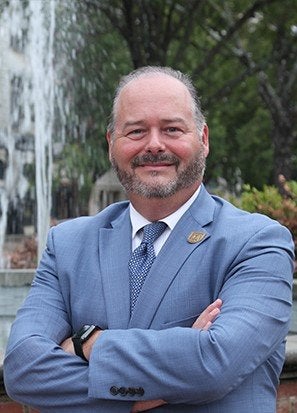After getting blindsided by the COVID-19 pandemic in 2020, healthcare professionals spent much of the year scrambling to treat the ever-growing flood of patients while dealing with sometimes conflicting information.
In 2021 the patients kept coming in a constantly changing ebb and flow, but the information became more consistent.
Dr. Philip Coule, vice president and chief medical officer for Augusta University Health System, said the healthcare system overall has become more sophisticated at treating SARS-CoV-2.
“I think we’ve gotten a little more adept at managing surge capacity as we hit each of these peaks. And how we manage that became a little more routine, although still very stressed on the system,” said Coule. “If I look at it from a public perspective, there were words that we use routinely in our vocabulary today that were not in the public vernacular of vocabulary. Overall, we’ve come a long way in terms of how we’re adapting to dealing with COVID-19.”
MORE: Omicron variant passes delta to become most dominant
Some of the advice, including wearing a mask, social distancing and frequent hand washing, remains the steps that still top the guidance healthcare professionals provide.
[adrotate banner=”51″]
But Coule remembers the early months, looking back at advice that was given based on often incomplete information. People were told when they went shopping, or had anything delivered, to immediately wipe down the bags and packages with a disinfectant, then wipe down each individual item.
“Originally, we thought that this was more surface-transmitted than it actually turns out that it is. And so, as we’ve learned things, some of the recommendations have changed over time,” he said. Then he added “It’s funny, because we went through a period of what I call ‘COV-idiocy’. Closing every other bathroom stall, closing every other sink in the bathroom. We would close down half the entrances to a building which created more crowding for a public space than if we had left all the entrances open.”
Coule said the pandemic has weighed heavily on all healthcare providers. He said they have had to deal with near-constant suffering, doing what they could for patients yet watching so many of them die.
“It’s not only the death and the dying. It is the moral injury that occurs when we can’t provide care. When we were overwhelmed and the system couldn’t cope, we felt like we couldn’t provide the same level of care to everyone,” he remembers. “We had to turn down patients that were requesting transfer here because we didn’t have the capacity to care for them. We had patients that we might have been able to save had we been able to get them here. That creates a great deal of moral injury for our staff. The suffering that the patients go through and the amount of death they’ve seen… They’re just being overworked.”
MORE: COVID-19 turned educators into students
When the first vaccines became available, Coule said they thought it would be the beginning of the end of the pandemic. Instead, there came was he called a ‘very toxic mix’ as vaccines became political, misinformation was spread and patients began asking for treatments with no proven benefit.
Health departments are keeping close watch on the omicron variant, the latest to appear and has now passed the delta variant as the most dominant strain in the U.S., according to the Centers for Disease Control and Prevention.
The highly transmissible omicron has healthcare providers bracing for yet another surge of COVID-19 cases. Coule said he never again wants to see numbers that have been seen in previous surges in his lifetime.
“I think the healthcare system across the country has been rattled by this,” said Coule. “I think the health care system across the country is going to need some longer-term strategies, including changes to reimbursement because healthcare has become more expensive. I think we are going to need federal assistance to really prop up the healthcare system moving forward because it’s in a precarious position right now.”
Augusta University Health can celebrate one, hard fought victory in 2021. It has the green light to build a 100-bed hospital in Columbia County.
[adrotate banner=”55″]
In 2014, AU Health, along with University Hospital and Doctors Hospital, filed a Certificate of Need with the Georgia Department of Community Health to get permission to build a new hospital. AU Health was selected by the state agency. University Hospital and Doctors Hospital both filed appeals.
Ultimately, University Hospital dropped its appeal, but Doctors Hospital continued a court battle until the Georgia Supreme Court decided in June 2021 not to review last year’s ruling by the Georgia Court of Appeals giving Augusta University the go ahead to build the hospital.
“I am so excited about Columbia County,” said Coule. “The architecture firm that’s been hired is top notch world class, the plans that I’ve seen for the building, at least you know some of the preliminary concepts are just exciting. It’s going to be just a phenomenal facility out there in Columbia County that I think will make the community very proud.”
While excited for what 2022 has in store, Philip Coule can’t forget what he and the staff at AU Health and the Augusta University Medical Center have faced and will continue to face as they continue to battle a viral killer no one saw coming.
One thing has kept him going.
“Family, friends, and an incredible team of people here who I knew were getting out of the bed every day and coming to work, giving it their best, not just going through the motions. And if they can do that, then I’ve got a responsibility to get out of the bed every day and come in and give it my best. We have an incredible team here. And I certainly depended on them during these tough times.”
Dana Lynn McIntyre is a Staff Reporter with The Augusta Press. You can reach her at dana@theaugustapress.com












